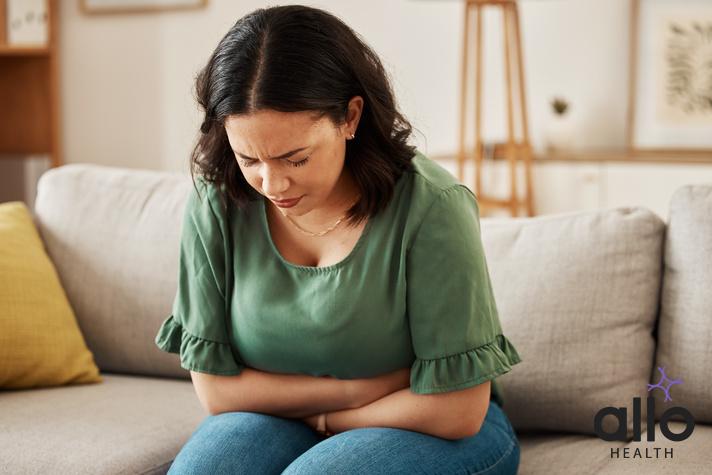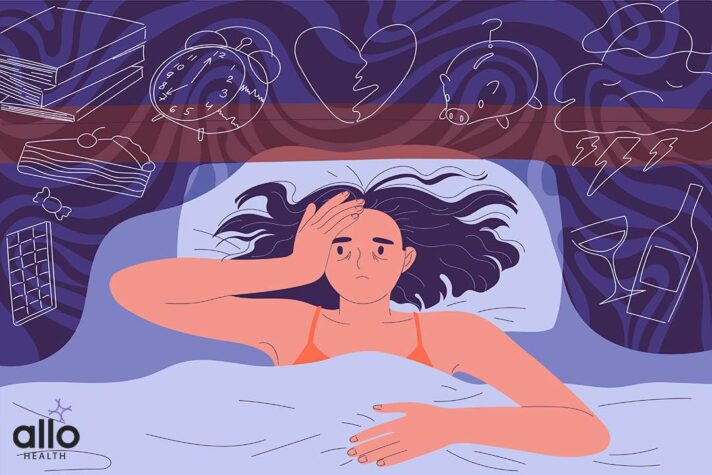Nausea During Arousal

Allo Health is dedicated to personalized well-being, offering support and trusted information tailored to individual health goals. The platform emphasizes human-generated content, led by a distinguished medical team of experts, including physicians and sexual health specialists. Their commitment to credibility involves rigorous fact-checking, authoritative research, and continuous updates to ensure accurate, up-to-date information. Allo Health's unique approach goes beyond conventional platforms, providing expert-led insights and a continuous commitment to excellence, with user feedback playing a crucial role in shaping the platform's authoritative voice.

Dr. Ajay Ravi holds an MBBS degree from JSS Medical College, Mysore. He has worked closely with the psychiatry department at JSS and has gained experience in the field of Sexual health and medicine.
Why This Was Upated?
Our experts continually monitor the health and wellness space, and we update our articles when new information became available.
Updated on 25 May, 2024
- Article was updated as part of our commitment to diversity, equity, and inclusion.

"The following blog article provides general information and insights on various topics. However, it is important to note that the information presented is not intended as professional advice in any specific field or area. The content of this blog is for general educational and informational purposes only.
Book consultation
The content should not be interpreted as endorsement, recommendation, or guarantee of any product, service, or information mentioned. Readers are solely responsible for the decisions and actions they take based on the information provided in this blog. It is essential to exercise individual judgment, critical thinking, and personal responsibility when applying or implementing any information or suggestions discussed in the blog."
Nausea During Arousal? Exploring the Intricate Connection Between Physical Sensations and Emotional States. This phenomenon raises intriguing questions about the interplay between arousal, emotions, and the body’s response. Delve into the complexities of this unique experience as we unravel the physiological and psychological aspects that contribute to nausea during moments of heightened arousal. Join us on a journey to understand this intriguing intersection of sensation and emotion.
What is Nausea During Arousal?
- Nausea during arousal is a rare phenomenon where individuals experience feelings of nausea or discomfort when becoming sexually aroused.
- It can occur in both men’s and women’s sex life and may be linked to a variety of factors, including psychological, hormonal, or physiological concerns.
- Psychological causes may include anxiety, stress, or negative associations with sexual activities.
- Hormonal fluctuations, such as changes in estrogen or testosterone levels, could contribute to nausea during arousal.
- Physiological factors like medications, medical conditions, or digestive concerns may also play a role.
- Communication with a healthcare professional is crucial to identify the underlying cause and explore potential treatments.
- Open communication with a partner can help reduce anxiety and create a supportive environment.
- Treatment options may include addressing underlying health concerns, therapy, or lifestyle changes.
- Seeking professional guidance is essential to address this issue and improve overall sexual well-being.
Physical Causes of Nausea During Arousal
- Increased blood flow: Arousal leads to increased blood flow to various areas of the body, including the digestive system.
- Stimulation of the vagus nerve: Arousal can stimulate the vagus nerve, which connects the brain to the digestive organs and may trigger nausea.
- Release of hormones: Hormones such as adrenaline and cortisol released during arousal can affect the gastrointestinal tract and induce nausea.
- Activation of the sympathetic nervous system: Arousal activates the sympathetic nervous system, which can influence digestive processes and lead to feelings of nausea.
- Individual variability: Sensitivity to physical changes during arousal varies among individuals, contributing to the occurrence of nausea in some cases.
Psychological Causes of Nausea During Arousal

In addition to physical causes, psychological factors can also contribute to nausea during arousal. Anxiety and stress can trigger the body’s fight-or-flight response, which can cause nausea as a natural response to perceived danger or threat. Similarly, past negative experiences with sex, such as trauma or abuse, can lead to feelings of nausea or discomfort during sexual arousal, or even pain during sex. Other mental health conditions, such as depression and bipolar disorder, can also cause nausea or interfere with sexual function and lead to nausea.
Another psychological factor that can contribute to nausea during arousal is performance anxiety. This is a common issue for many people, especially those who are new to sexual experiences or who have had negative experiences in the past. The pressure to perform or satisfy a partner can cause feelings of anxiety and stress, which can lead to nausea or other physical symptoms.
Additionally, certain medications used to treat mental health conditions, such as antidepressants and antipsychotics, can also cause nausea as a side effect. It is important to talk to a healthcare provider about any medications and medical care, being taken and their potential side effects on sexual function and nausea.
Common Symptoms of Nausea During Arousal
- Sweating: Increased perspiration can be a common symptom of nausea during arousal.
- Dizziness: A feeling of lightheadedness or unsteadiness may accompany arousal-induced nausea.
- Rapid Heartbeat: Elevated heart rate can be experienced along with nausea during arousal.
- Pallor: Skin may become pale or clammy as a physiological response to arousal-induced nausea.
- Hyperventilation: Shallow or rapid breathing may occur, contributing to feelings of nausea.
- Upset Stomach: Nausea and discomfort in the abdominal region are typical symptoms during arousal.
- Anxiety: Emotional factors can exacerbate nausea during arousal, leading to heightened anxiety.
- Muscle Tension: Tense muscles, particularly in the abdominal area, may contribute to nausea.
- Cognitive Distress: Intrusive thoughts or mental discomfort may accompany physical symptoms of nausea.
- Increased Salivation: Excessive saliva production can be an additional manifestation during arousal-induced nausea.
How to Diagnose Nausea During Arousal

- Pay attention to patterns: Note if nausea consistently occurs during arousal.
- Rule out other causes: Consider factors like medications, underlying medical conditions, or dietary concerns.
- Monitor triggers: Identify specific situations or stimuli linked to nausea during arousal.
- Consult healthcare professionals: Seek guidance from a doctor or specialist for a thorough evaluation.
- Explore psychological factors: Evaluate stress, anxiety, or emotional triggers that may contribute.
- Conduct tests: Medical tests such as bloodwork or imaging may be necessary to identify underlying concerns.
- Consider lifestyle changes: Adjust diet, exercise, or sleep patterns to see if they impact nausea during arousal.
- Seek therapy: Psychological counseling may help address emotional aspects linked to the symptoms.
- Rule out pregnancy: If applicable, consider pregnancy as a potential cause of nausea during arousal.
Treatment Options for Nausea During Arousal
- Ginger: Considered a natural remedy, ginger can help alleviate nausea during arousal.
- Deep breathing: Practicing slow, deep breaths can help calm the nervous system and reduce nausea.
- Medications: Anti-nausea medications, such as dimenhydrinate or ondansetron, may be prescribed by a healthcare professional.
- Acupressure: Applying pressure to the P6 acupressure point on the inner wrist may provide relief.
- Hydration: Staying well-hydrated can prevent dehydration-related nausea.
- Avoiding trigger foods: Identify and avoid foods that may exacerbate nausea.
- Relaxation techniques: Engage in activities like meditation or progressive muscle relaxation to reduce stress and nausea.
- Professional guidance: Consult a healthcare provider for personalized advice and further evaluation if nausea persists.
Medication and Non-Medication Treatments for Nausea During Arousal
If your nausea during arousal is caused by motion sickness or overeating, over-the-counter medications, such as antihistamines or anti-nausea medication, can help reduce symptoms. Your healthcare provider may also prescribe medication to help manage anxiety or depression if they are contributing to your symptoms. In addition to medication, non-medication treatments, such as cognitive-behavioral therapy or couples therapy, can also help address underlying psychological factors that may be contributing to nausea during arousal.
It is important to note that some individuals may experience nausea during arousal due to medical conditions, such as gastroesophageal reflux disease (GERD) or irritable bowel syndrome (IBS). In these cases, treating the underlying condition may help alleviate symptoms. Lifestyle changes, such as avoiding trigger foods or eating smaller, more frequent meals, may also be recommended.
If medication and non-medication treatments do not effectively manage nausea during arousal, it is important to speak with your healthcare provider to rule out any underlying medical conditions or to explore other treatment options. It is also important to communicate with your partner about your symptoms and to find ways to maintain intimacy and connection that are comfortable for both partners.
Lifestyle Changes to Help Reduce Nausea During Arousal
- Stay hydrated: Drink plenty of water throughout the day to prevent dehydration, which can contribute to nausea during arousal.
- Balanced diet: Opt for smaller, well-balanced meals to avoid overeating and reduce the likelihood of nausea.
- Avoid trigger foods: Identify and steer clear of foods that may trigger nausea for you, such as spicy or greasy foods.
- Ginger intake: Incorporate ginger into your diet, as it is known for its anti-nausea properties.
- Mindful breathing: Practice deep, slow breathing techniques to calm the nervous system and minimize nausea.
- Regular exercise: Engage in regular physical activity to promote overall well-being and reduce stress, which can contribute to nausea.
- Adequate sleep: Ensure you get enough rest to support your body’s overall health and reduce the risk of nausea.
- Stress management: Explore stress-reducing activities like meditation or yoga to maintain a balanced mental state during arousal.
- Medication review: Consult with a healthcare professional to evaluate any medications you are taking that may contribute to nausea.
- Open communication: Discuss any concerns or anxieties with your partner to create a supportive and understanding environment.
Coping Strategies for Dealing with Nausea During Arousal
- Deep Breathing: Inhale slowly through the nose, and exhale through the mouth to calm the nervous system.
- Focus on Distraction: Engage in activities that divert attention from the sensation of nausea.
- Hydration: Sip on ginger tea or water to stay hydrated and soothe the stomach.
- Proper Meal Timing: Avoid heavy meals before arousal to prevent digestive discomfort.
- Ginger or Peppermint: Use natural remedies like ginger or peppermint to alleviate nausea.
- Adjust Body Position: Find a comfortable position to reduce the intensity of nausea.
- Mindfulness Techniques: Practice mindfulness to stay present and minimize anxiety-related nausea.
- Communication: Openly communicate with a partner about any discomfort, fostering understanding.
- Medical Advice: Consult a healthcare professional if nausea persists or worsens.
Alternative Therapies for Treating Nausea During Arousal
- Acupressure: Applying pressure to specific points on the body, such as the wrist or inner forearm, may alleviate nausea during arousal.
- Aromatherapy: Certain scents, like peppermint or ginger, can be inhaled or diffused to help calm the digestive system and reduce nausea.
- Herbal Teas: Ginger and chamomile teas have anti-nausea properties and can be consumed before or after arousal.
- Deep Breathing: Practicing deep, slow breathing can help relax the body and alleviate nausea.
- Mind-Body Techniques: Mindfulness meditation and guided imagery may assist in managing nausea by promoting relaxation.
- Hydration: Sipping on clear liquids, such as ginger tea or diluted fruit juices, helps maintain hydration and ease nausea.
- Dietary Adjustments: Avoiding heavy or spicy meals before arousal can prevent nausea. Opt for light snacks if needed.
- Homeopathic Remedies: Some individuals find relief from nausea using homeopathic remedies like Nux Vomica or Ipecacuanha.
- CBD or Cannabis: For those in regions where it’s legal, CBD or medical cannabis may be considered for anti-nausea effects.
- Consult a Professional: Always consult with a healthcare provider or alternative medicine practitioner for personalized advice and guidance.
The Importance of Seeking Medical Help for Persistent Symptoms
While nausea during arousal is usually temporary and harmless, persistent symptoms can indicate an underlying medical condition that requires treatment. In addition, persistent nausea or vomiting can lead to dehydration or malnutrition if left untreated. If you experience severe or persistent symptoms, it is important to speak with a healthcare provider.
Some medical conditions that can cause persistent nausea include gastroesophageal reflux disease (GERD), peptic ulcers, and gallbladder disease. These conditions can be diagnosed through medical tests and treated with medication or surgery. It is important to seek medical help if you experience persistent nausea or vomiting, as early diagnosis and treatment can prevent complications and improve your quality of life.
Tips for Preventing Nausea During Sexual Activity
There are several tips you can follow to help prevent nausea during sexual activity. These include: avoiding heavy meals before sex, staying hydrated, practicing relaxation techniques, and avoiding triggers, such as certain positions or environments. In addition, it can be helpful to communicate with your partner about your feelings and needs during sex.
Another tip for preventing nausea during sexual activity is to take breaks when needed. It’s important to listen to your body and take breaks if you start to feel uncomfortable or nauseous. This can also be a good opportunity to communicate with your partner and make sure you’re both comfortable and enjoying the experience.
If you experience nausea frequently during sexual activity, it may be helpful to talk to a healthcare provider. They can help identify any underlying medical conditions or offer additional tips for managing nausea during sex. It’s important to prioritize your health and well-being, and seeking medical advice can be a helpful step in doing so.
Understanding the Link Between Migraines and Sexual Activity
- Migraines and sexual activity are connected, with some individuals experiencing migraines triggered by or associated with sexual engagement.
- Sexual activity can act as a trigger for migraines in some individuals, possibly due to hormonal changes, physical exertion, or emotional factors.
- On the other hand, there is evidence that sexual activity may also have a pain-relieving effect for some migraine sufferers, attributed to the release of endorphins and the distraction from pain.
- Communication between partners is crucial, as understanding each other’s triggers and preferences can help manage migraines in the context of sexual activity.
- Healthcare professionals recommend monitoring patterns, seeking medical advice, and exploring lifestyle adjustments to better understand and manage migraines related to sexual activity.
How Hormonal Changes Can Impact Sexual Function and Cause Nausea
- Hormonal changes, such as fluctuations in estrogen and progesterone levels, can affect sexual function.
- Reduced libido, vaginal dryness, and difficulty achieving orgasm may result from hormonal imbalances.
- Nausea can be linked to hormonal changes, possibly due to their influence on the digestive system.
- Pregnancy-related hormonal shifts, like increased hCG levels, may contribute to nausea during sexual activity.
- Menstrual cycle variations may impact sexual desire and function, with nausea being a possible side effect.
- Hormonal contraceptives can cause sexual side effects and occasionally induce nausea.
- Consultation with a healthcare professional is crucial to address hormonal imbalances and associated symptoms.
Most Asked Questions
-
What causes nausea during arousal?
Nausea during arousal can result from hormonal changes, anxiety, or increased blood flow diverting from the digestive system.
-
Is nausea common during pregnancy and sexual activity?
Yes, hormonal shifts during pregnancy can cause nausea, and heightened sensitivity might lead to discomfort during sexual activity.
-
Can contraceptives contribute to nausea during arousal?
Hormonal contraceptives may influence nausea during arousal due to their impact on hormonal levels and overall bodily functions.
-
How does anxiety affect nausea during arousal?
Anxiety can trigger nausea by activating the body's stress response, impacting the gastrointestinal system during intimate moments.
-
When should one seek medical advice for nausea during arousal?
Persistent or severe nausea during arousal warrants consultation with a healthcare professional to rule out underlying hormonal issues or other health concerns.






































